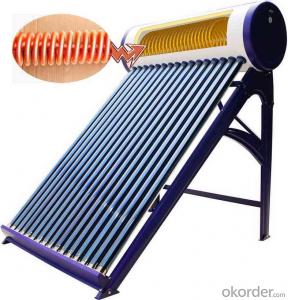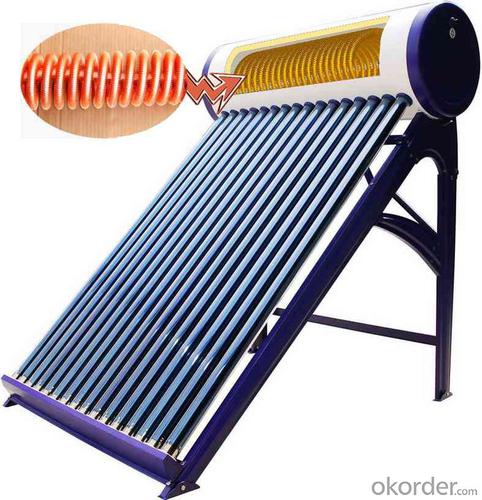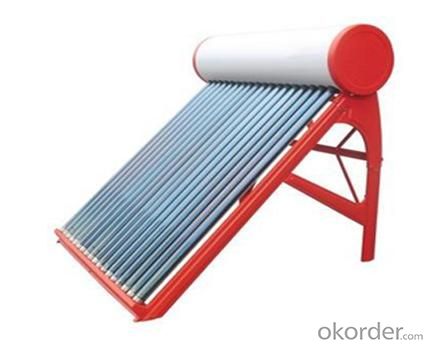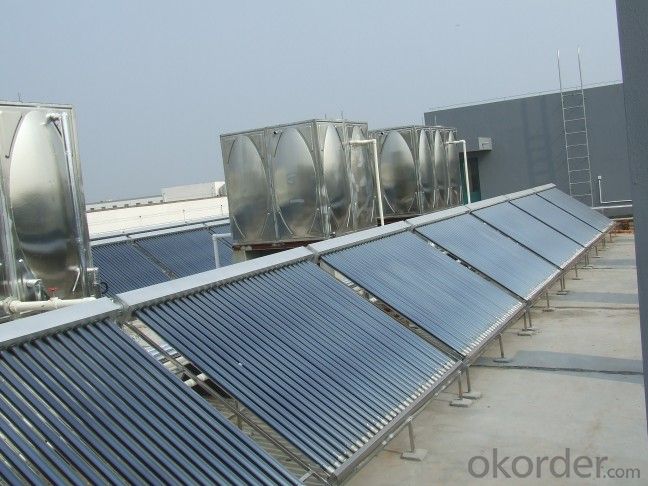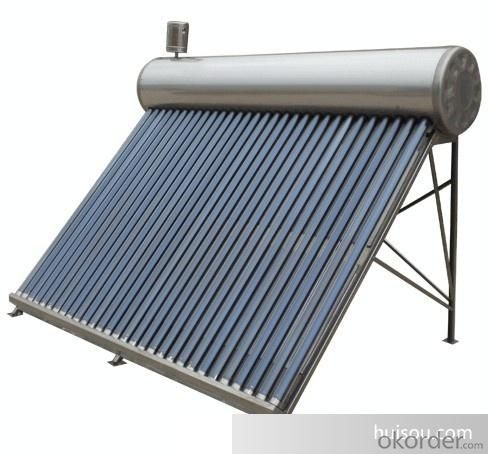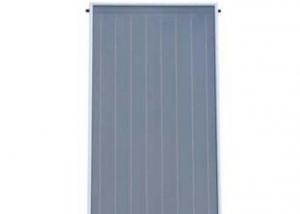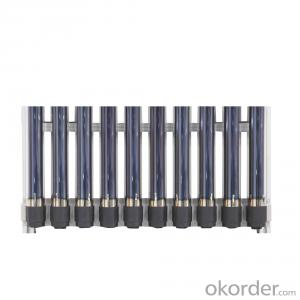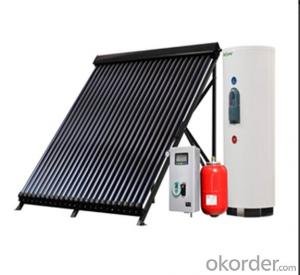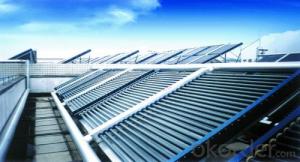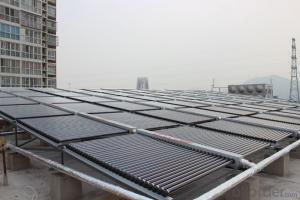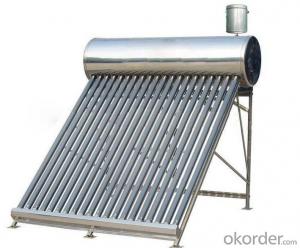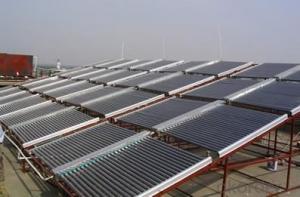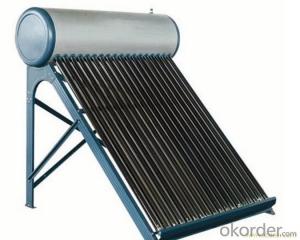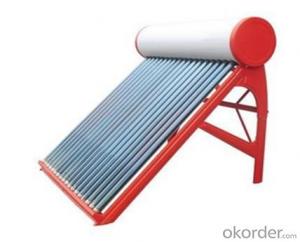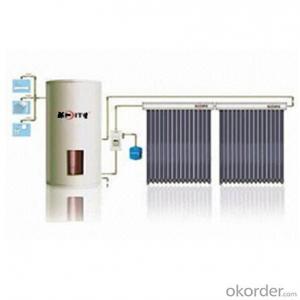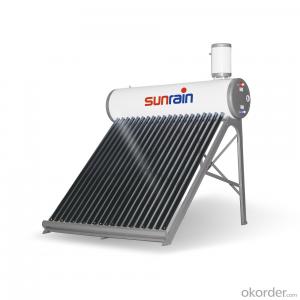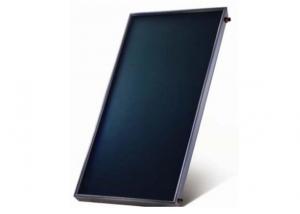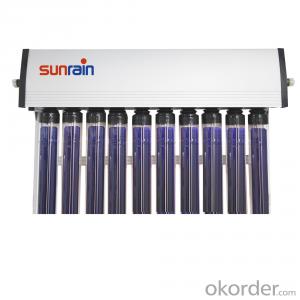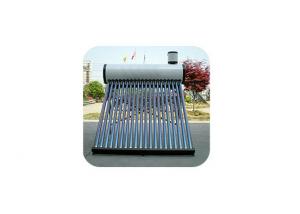Solar Water Heater India with Copper Coil in Water Tank
- Loading Port:
- China main port
- Payment Terms:
- TT OR LC
- Min Order Qty:
- 1 set
- Supply Capability:
- 6000 set/month
OKorder Service Pledge
OKorder Financial Service
You Might Also Like
Introduction of Non-Pressure Solar Water Heater:
Non-pressure Solar Heater is one of the most economical solar water heating device with pretty high efficiency at the same time. It consists of hot water storage tank, solar vacuum tubes with mouth plug in storage tank, and bracket supporting tank and tubes.When cold water in evacuated tubes is heated with solar irradiation, as the specific gravities of hot water and cold water are different, hotter water goes upward to storage tank and colder water goes downward to glass tubes. through this continuous circulation, the cold water in storage tank will be gradually heated till sunset.
Specialty:
1. High thermal performance and working temperature: the heat exchanging rate even in winter can up above 55%.
2. Heat collecting efficiency is at least 20% above common solar systems.
3. Work in all day and all season: no matter any corner of the world, this system can work well even -40℃ to avoid the tube freezing problem.
4. Reliability: No water following through the tube, so water scale can not generate and tube cracks could be avoided, the system still can keep working even with some damaged tubes.
5. It can connect with water tap and work automatically with pressure0.6Mpa, bring enjoyable washing experience.
6. Safety: P/T valve would release pressure and temperature to protect tank..
Technical Specification:
1. Outer tank material: SUS304 stainless steel or powder coated color steel
2. Inner tank material: 1.2mm thick SUS304 food grade stainless steel ( Optional material SUS316L)
3. Vacuum tube material: borosilicate glass 3.3; AL-SS-CU absorb coating, with copper heat pipe inside
4. Frame material: 1.2mm thickness stainless steel
5. Insulation material: 55mm thickness polyurethane
6. Suitable for mains pressure water(up to 8 bar/116psi)
7. Easy plug-in installation
8. Install the T/P valve on the pressurized tank
9. Seal material: Stabilized High Temperature Silicon
Outer tank material: SUS304 stainless steel or powder coated color steel
Inner tank material: 1.2mm thick SUS304 food grade stainless steel ( Optional material SUS316L)
Vacuum tube material: borosilicate glass 3.3; AL-SS-CU absorb coating, with copper heat pipe inside
Frame material: 1.2mm thickness stainless steel
Insulation material: 55mm thickness polyurethane
Suitable for mains pressure water(up to 8 bar/116psi)
Easy plug-in installation
Install the T/P valve on the pressurized tank
Seal material: Stabilized High Temperature Silicon
19. Vacuum Tube | 20. Size (mm) | 21. Φ47*1500 / Φ58*1800 / Φ70*2100 | |||||
22. Tube (pcs) | 23. 10 / 12 / 15 / 18 / 20 / 22 / 24 / 30 / 36 / 42 | ||||||
24. Material | 25. Borosilicate 3.3 glass, magnetron spluttering selective coating | ||||||
26. Coating | 27. Single-target AL-N/AL or Three-target AL/N-Cu-SS | ||||||
28. Water Tank | 29. Capacity | 30. 80L ~ 500L for hot water storage tank | |||||
31. Inner tank | 32. Food-grade stainless steel SUS304-2B / SUS316 | ||||||
33. Insulation | 34. High-density polyurethane foam with 70~80 hour heat preservation | ||||||
35. Tank shell | 36. Food-grade stainless steel SUS304-2B | ||||||
37. Bracket | 38. Shaped strong aluminum alloy structure adaptable for flat or slope roof | ||||||
39. Accessories | 40. Anti-aging silicon seals, Dustproof seals, Air-vent cap, Stainless screws | ||||||
41. Auxiliary Devices | 42. Assistant tank, Intelligent controller, Electrical heater, Magnesium anodes | ||||||
43. Tilt Angle | 44. 25 ~ 50° | ||||||
45. Water Output | 46. 45 - 95°C | ||||||
47. Hail Resistance | 48. Φ25mm diameter | ||||||
49. Model Number | 50. Solar Vacuum Tube | 51. Tank 52. Liter | 53. System 54. Liter | 55. Container Loading Qty /sets | |||
56. Size /mm | 57. Qty /pcs | 58. 20GP | 59. 40GP | 60. 40HQ | |||
61. VNS-58SA12-100 | 62. Φ58*1800 | 63. 12 | 64. 100 | 65. 132 | 66. 58 | 67. 119 | 68. 140 |
69. VNS-58SA15-130 | 70. 15 | 71. 130 | 72. 170 | 73. 54 | 74. 108 | 75. 131 | |
76. VNS-58SA18-150 | 77. 18 | 78. 150 | 79. 198 | 80. 43 | 81. 86 | 82. 105 | |
83. VNS-58SA20-170 | 84. 20 | 85. 170 | 86. 223 | 87. 40 | 88. 80 | 89. 97 | |
VNS-58SA24-200 | 24 | 200 | 263 | 35 | 70 | 85 | |
VNS-58SA30-250 | 30 | 250 | 329 | 28 | 56 | 68 | |
VNS-58SA36-300 | 36 | 300 | 395 | 23 | 47 | 57 | |
Products Show
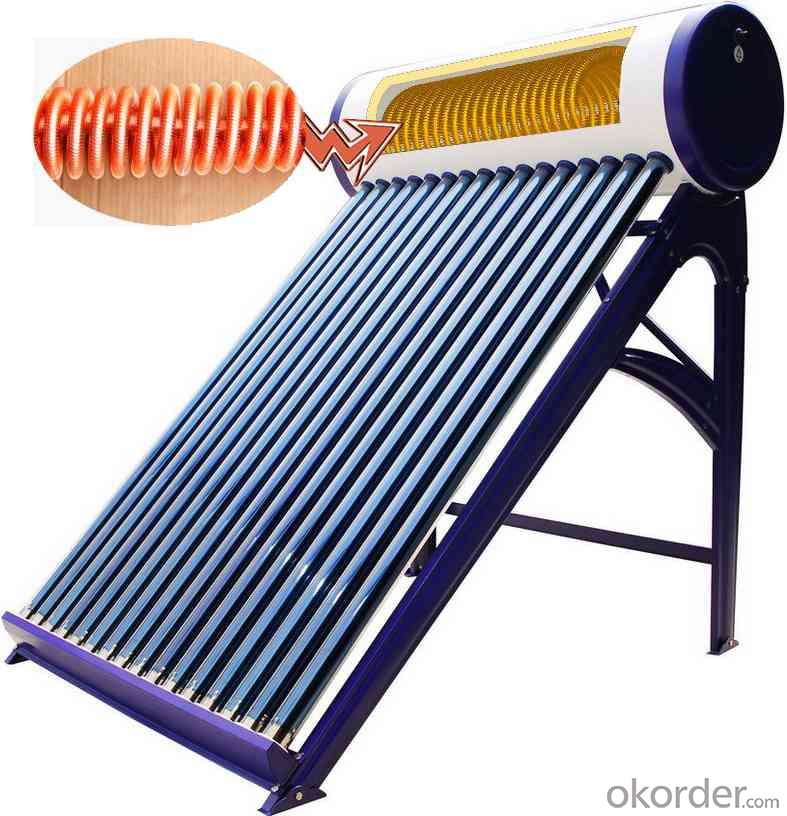
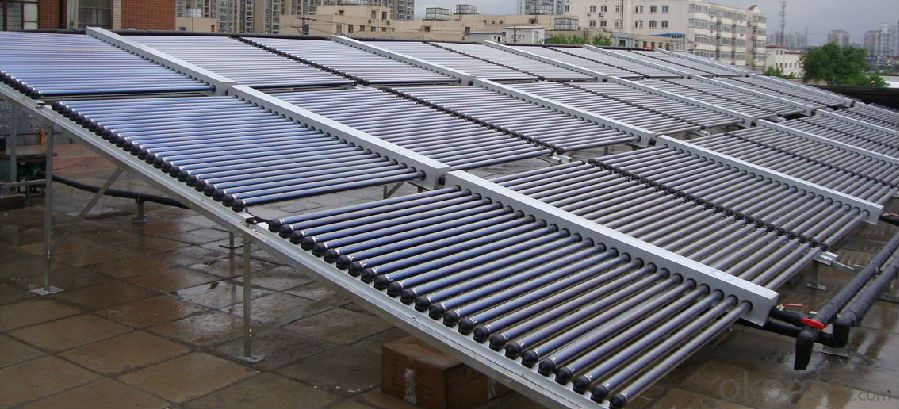
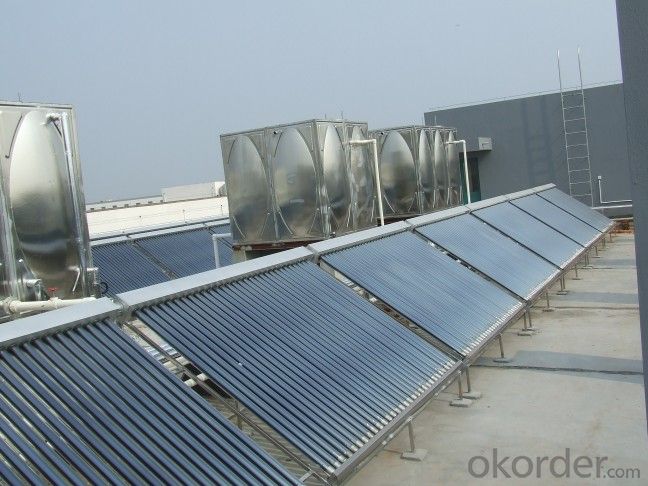
Our Services
1. OEM service
2. Warranty: 5 years
3. Considerable after sale service
Color steel Compact pressure Thermal solar heater
FAQ:
1. What’s the delivery time?
10 days after receiving deposit.
2. How long is the warranty?
5 years for whole system, 1 year for accessory
3. What’s your production capacity?
6000sets/month
4. What’s the MOQ?
1 set.
5. What’s your payment term?
Container: 30% T/T in advance for deposit, 70% T/T before shipment for fist order.
70% T/T after seeing copy of B/L from second order
Sample: 100% T/T in advance
Other choices: L/C at sight.
6. What certifications do you have?
CE, SOLAR KEYMARK, SRCC and etc.
- Q: Can a solar water heater be used in areas with limited access to energy conservation measures?
- Yes, a solar water heater can be used in areas with limited access to energy conservation measures. Solar water heaters rely on the sun's energy to heat water, making them a sustainable and cost-effective option for areas with limited access to traditional energy sources. They can be installed independently of energy conservation measures and provide a reliable and efficient way to heat water.
- Q: Can a solar water heater be used in areas with extreme temperature fluctuations?
- Yes, a solar water heater can be used in areas with extreme temperature fluctuations. Solar water heaters are designed to withstand a range of temperatures and are capable of operating in both extremely hot and cold climates. The key to their effectiveness lies in the design and insulation of the system. In areas with extreme cold temperatures, solar water heaters may be equipped with freeze protection mechanisms such as antifreeze heat transfer fluids or heat exchangers. These mechanisms prevent the water or heat transfer fluid from freezing, ensuring that the system continues to function optimally. Similarly, in areas with extreme heat, solar water heaters may be designed with efficient insulation to prevent excessive heat loss. Additionally, the positioning of the solar collectors can be adjusted to optimize heat absorption in colder climates or to reduce heat absorption in hotter climates. Therefore, with proper design and insulation considerations, solar water heaters can be effectively used in areas with extreme temperature fluctuations.
- Q: How does the efficiency of a solar water heater vary based on the climate?
- The efficiency of a solar water heater can vary based on the climate. In regions with ample sunlight and high average temperatures, such as tropical climates, solar water heaters tend to be more efficient as they can harness more solar energy to heat the water. In contrast, in colder climates with less sunlight, the efficiency may be lower as the system may struggle to generate enough heat to warm the water to the desired temperature. However, advancements in technology and the use of insulation can help improve the efficiency of solar water heaters even in colder climates.
- Q: Three homes to install solar water heaters, 58mm vacuum tube that the minimum number of roots, the length of the right? What is the capacity of the tank? In addition to the purchase of materials also need to pay attention to what?
- 3 control instrument. These two sensors are most likely to be bad. (special attention must be given to lightning protection) general warranty is one year. What you say will give you an extension. Merchants can do the longest three years (this is a separate policy to manufacturers). General businesses do not want to look for trouble, only to the user that a year to see your eloquence
- Q: Can a solar water heater be used in areas with limited access to water infrastructure?
- Yes, a solar water heater can be used in areas with limited access to water infrastructure. Solar water heaters use the sun's energy to heat water, eliminating the need for traditional water infrastructure like pipes and pumps. They typically consist of a solar collector, which absorbs heat from the sun, and a storage tank to hold the heated water. Since solar water heaters do not rely on a constant supply of water, they can be an effective solution for areas with limited water infrastructure. They can be used in remote locations where access to clean water is limited, or in areas where traditional water infrastructure is unreliable or nonexistent. Solar water heaters are easy to install and maintain, and they can provide hot water for a variety of purposes, including bathing, cooking, and cleaning. By harnessing the power of the sun, they offer a sustainable and cost-effective solution for heating water in areas with limited access to water infrastructure.
- Q: Is it possible to retrofit an existing water heater with solar panels?
- Indeed, it is plausible to equip an already existing water heater with solar panels. The process of retrofitting a water heater with solar panels entails the installation of a solar thermal system that harnesses the sun's energy to warm the water. This can be accomplished by situating solar panels on the rooftop or in an area that receives optimal sunlight exposure, and linking them to the current water heater via a network of pipes and valves. The solar panels accumulate the sun's energy and transfer it to a fluid, commonly a blend of water and antifreeze, which courses through the panels. As the fluid is heated by the sun, it is then channeled to a heat exchanger within the pre-existing water heater, where it imparts the heat to the water stored in the tank. Consequently, this procedure significantly diminishes the energy required to heat the water, thereby leading to reduced energy expenses and a more environmentally-friendly solution. Retrofitting a pre-existing water heater with solar panels can prove to be economical since it utilizes the already established infrastructure. Nonetheless, it is crucial to consider the age and condition of the water heater, as older or inefficient models may not be suitable for solar retrofitting. Additionally, the availability of roof space or area for solar panel installation should be evaluated to ensure maximum exposure to sunlight. It is advisable to consult a professional solar installer or an HVAC technician experienced in solar retrofitting to assess the viability and compatibility of the current water heater for integration with solar panels. They can provide expert advice on the most suitable approach, equipment requirements, and potential financial incentives or tax credits that may be accessible for such retrofit projects.
- Q: Can a solar water heater be used in areas with limited coal availability?
- Certainly! In regions where coal is scarce, a solar water heater can be effectively employed. The utilization of sunlight energy by solar water heaters eradicates the necessity for conventional fuel sources such as coal. These heaters consist of solar panels or collectors that absorb sunlight and convey the heat to water, which is then stored in an insulated tank for future use. As long as there is abundant sunlight in the vicinity, a solar water heater can serve as a remarkably efficient and environmentally friendly substitute for coal-powered heating systems. In truth, areas with limited coal availability can greatly reap the benefits of solar water heaters, as they provide a sustainable and renewable source of hot water without relying on fossil fuels.
- Q: Can a solar water heater be used in areas with limited access to maintenance expertise?
- Yes, a solar water heater can be used in areas with limited access to maintenance expertise. Solar water heaters are relatively simple systems that require minimal maintenance. They have fewer moving parts compared to traditional water heaters, reducing the need for frequent repairs. Additionally, solar water heaters are designed to be durable and reliable, making them suitable for areas with limited maintenance expertise. However, it is essential to provide basic training and education to users on how to operate and maintain the system to ensure its longevity and efficiency.
- Q: Can a solar water heater be used in combination with other renewable energy systems?
- Yes, a solar water heater can be used in combination with other renewable energy systems. In fact, it is quite common to integrate solar water heaters with other renewable energy sources to maximize energy efficiency and reduce reliance on traditional energy sources. One common combination is to use a solar water heater in conjunction with a photovoltaic (PV) system. The PV system generates electricity from sunlight, which can be used to power the electric components of the solar water heater, such as circulation pumps or controls. This combination allows for a more sustainable and self-sufficient water heating system. Additionally, solar water heaters can also be integrated with other renewable energy systems such as wind turbines or geothermal heat pumps. These combinations can provide a more comprehensive and versatile renewable energy solution by utilizing multiple sources of clean energy to meet various energy needs. By combining different renewable energy systems, homeowners and businesses can reduce their carbon footprint, lower energy costs, and increase their energy independence. The integration of a solar water heater with other renewable energy technologies represents a step towards a more sustainable and environmentally friendly energy future.
- Q: Can a solar water heater be used in areas with high levels of air pollution from oil refineries?
- Yes, a solar water heater can still be used in areas with high levels of air pollution from oil refineries. The efficiency of the solar water heater may be slightly affected by the presence of air pollution, but it can still effectively harness solar energy to heat water. Regular maintenance and cleaning of the solar panels may be required to ensure optimal performance in such polluted environments.
Send your message to us
Solar Water Heater India with Copper Coil in Water Tank
- Loading Port:
- China main port
- Payment Terms:
- TT OR LC
- Min Order Qty:
- 1 set
- Supply Capability:
- 6000 set/month
OKorder Service Pledge
OKorder Financial Service
Similar products
Hot products
Hot Searches
Related keywords
